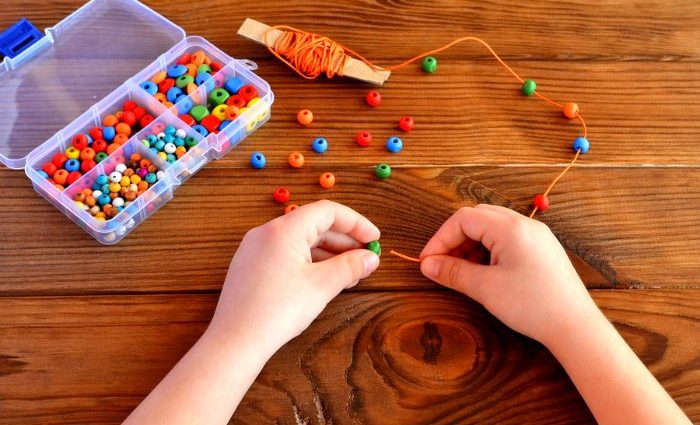Children love to sort out cereals, touch pebbles, buttons. These activities not only help to learn about the world, but also have a positive effect on the speech, imagination and logic of the child.
Fine motor skills are a complex and well-coordinated interaction of the nervous, skeletal and muscular systems, thanks to which we can perform precise movements with the hands. In other words, this is the capture of small objects, and the handling of a spoon, fork, knife. Fine motor skills are indispensable when we fasten buttons on a jacket, tie shoelaces, embroider, write. Why is it important and how to develop it?
Our brain can be compared to the most complex computer. It analyzes information coming from the sense organs and internal organs, forms response motor and behavioral reactions, is responsible for thinking, speech, the ability to read and write, and the ability to be creative.
About a third of the cerebral cortex is responsible for the development of hand motor skills. This third is located as close as possible to the speech center. That is why fine motor skills are so closely related to speech.
The more the child works with his fingers, the better the fine motor skills of the hands and speech develop. It is not for nothing that in Russia it has long been customary to teach children to play with their fingers from an early age. Probably everyone knows “Ladushki”, “Magpie-white-sided”. Even after washing, the child’s hands are wiped with a towel, as if massaging each finger.
If you do not develop fine motor skills, not only speech will suffer, but also the technique of movements, speed, accuracy, strength, coordination.
It also affects the formation of logic, thinking skills, strengthens memory, trains observation, imagination and coordination. The development of fine motor skills is reflected in the child’s studies and plays an important role in preparing for school.
The ability to perform certain actions is closely related to the age of the child. He learns one skill and only then can he learn something new, so the level of motor skills formation must be observed.
- 0-4 месеци: the child is able to coordinate eye movements, tries to reach objects with his hands. If he manages to take the toy, then the squeezing of the brush occurs reflexively.
- 4 months – 1 year: the child can shift objects from hand to hand, perform simple actions like turning pages. Now he can grab even a small bead with two fingers.
- 1–2 године: movements are more and more confident, the child uses the index finger more actively, the first drawing skills appear (dots, circles, lines). The child already knows which hand is more convenient for him to draw and take a spoon.
- 2–3 године: hand motor skills allow the child to hold scissors and cut paper. The manner of drawing changes, the child holds the pencil in a different way, can draw figures.
- 3–4 године: the child draws confidently, can cut the sheet along the drawn line. He has already decided on a dominant hand, but in the games he uses both. Soon he will learn to hold a pen and pencil just like an adult.
- 4-КСНУМКС година: while drawing and coloring, the child does not move the whole arm, but only the brush. The movements are more precise, so cutting out an object from paper or coloring a picture without leaving the outline is no longer so difficult.
- 5-КСНУМКС година: the child holds the pen with three fingers, draws small details, knows how to use scissors.
If fine motor skills are not developed, not only speech will suffer, but also the technique of movements, speed, accuracy, strength, and coordination. Modern children, as a rule, do not have very good motor skills, because they rarely have to fasten buttons and tie shoelaces. Children are less involved in household chores and needlework.
If a child has difficulty with writing and drawing and parents cannot help him, this is a reason to seek the advice of a specialist. Who will help? Violation of fine motor skills may be associated with problems of the nervous system and some diseases, which requires the consultation of a neurologist. You can also seek advice from a teacher-defectologist and speech therapist.
О Девелоперу
Elvira Gusakova – Teacher-defectologist of the City Psychological and Pedagogical Center.










